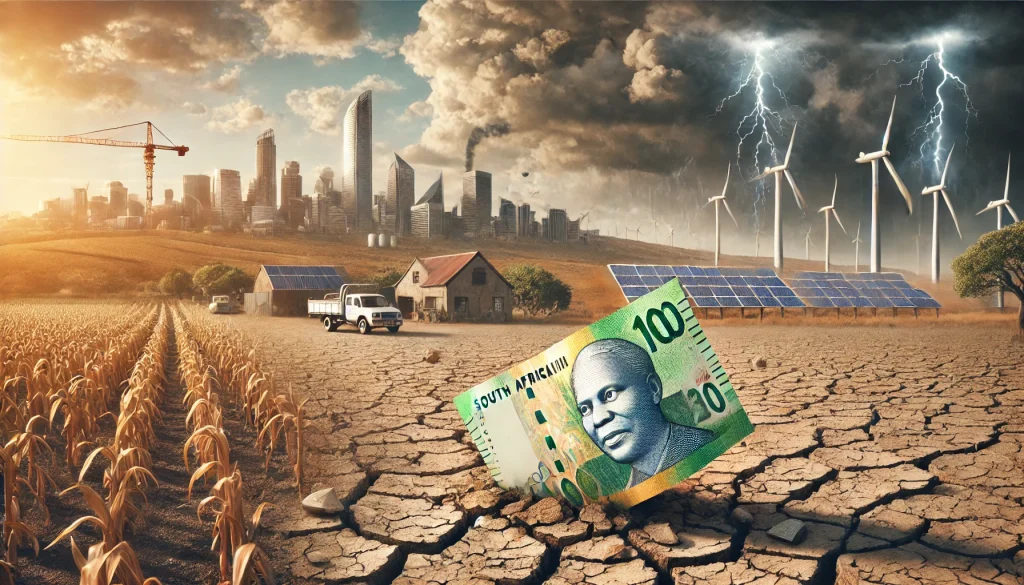Climate change is having profound effects on South Africa, both environmentally and economically. As global temperatures rise, the country’s climate is becoming increasingly unpredictable, leading to extreme weather events. These changes threaten ecosystems and have significant impacts on agriculture, water resources, and biodiversity. The financial implications are not only felt at the national level but also trickle down to individuals, affecting their everyday financial decisions and stability.
The economic landscape in South Africa is being reshaped due to climate change. Businesses face increased operational costs, and sectors such as agriculture and energy are under immense pressure. Rising temperatures and irregular rainfalls damage crops, reduce yields, and increase the cost of food.
Rising costs of living due to climate change

As climate change progresses, the cost of basic necessities in South Africa is continually rising. Food prices are skyrocketing as agricultural outputs suffer from erratic weather patterns. Similarly, the increased demand for energy, needed to cool homes during heatwaves or provide warmth during cold snaps, is driving up electricity bills.
Natural disasters, exacerbated by climate change, pose a significant threat to South African homes. The cost of insurance is rising as companies attempt to cover the increasing risks associated with these events. Moreover, the physical damage caused by floods and storms requires costly repairs, further stretching personal finances.
The lifestyle changes necessitated by climate change-induced economic pressures highlight the urgent need for financial resilience. For many South Africans, adjusting to these rising costs involves cutting non-essential expenses or seeking additional income sources.
Investment risks and opportunities
Climate change is influencing South Africa’s investment landscape significantly. Traditional sectors such as mining and agriculture are under threat, as they are particularly vulnerable to environmental changes. Investors are increasingly wary of the risks associated with these industries due to their reliance on stable climatic conditions. Conversely, the shift towards sustainable and renewable energy sources presents new opportunities. The demand for clean energy is driving growth in sectors like solar and wind power.
Investors are finding these sectors attractive for their potential to mitigate climate risks and provide long-term returns. Adapting investment strategies to account for climate change is becoming essential. By focusing on sustainable industries, investors can not only reduce their risk exposure but also contribute positively to the environment.
Climate-related financial policies and regulations
The South African government is implementing several policies to address the financial impact of climate change. Regulatory measures are being introduced to encourage eco-friendly practices and penalize unsustainable activities. These regulations aim to align economic activities with environmental goals and ensure a sustainable future for the economy.
In an effort to promote sustainable investment, the government is offering various incentives. These include tax breaks and financial grants for businesses and individuals who invest in green technologies. Such incentives play a vital role in steering the economy towards a more resilient and sustainable future.
Adapting investment strategies to account for climate change is becoming essential. By focusing on sustainable industries, investors can not only reduce their risk exposure but also contribute positively to the environment. To understand how South Africans are adapting their financial strategies, explore insights from industry experts on climate finance.
The role of green finance and sustainable investing
Green finance is gaining momentum in South Africa as the nation grapples with the realities of climate change. Financial institutions are developing innovative products that support environmentally sustainable projects. Investors are increasingly recognizing the value of sustainable investing. By choosing green investments, they not only support a cleaner environment but also gain financial benefits from the growth of renewable energy and other sustainable sectors.
The integration of sustainability into financial strategies offers a pathway to more secure investments and enhanced adaptability to climate fluctuations. For those looking to secure their financial future, engaging with green finance and sustainable investing is increasingly becoming a priority.
Strategies for financial resilience against climate change
Developing financial resilience against the impacts of climate change is critical for individuals and businesses in South Africa. One effective strategy is diversifying investments to include assets less susceptible to climate risks. Another key strategy is adopting energy-efficient practices and technologies. Reducing energy consumption not only lowers utility bills but also contributes to lessening reliance on fragile environmental conditions.
Incorporating these strategies into everyday financial planning can enhance individual and corporate resilience to climate impacts. Preparation and proactive management are essential in adapting to the changing financial environment brought about by climatic transformations.
Conclusion: The future of finance in a changing climate
As climate change continues to influence South Africa’s economy, financial strategies must adapt. The shift towards sustainable investments and green finance presents opportunities for growth while mitigating risks associated with environmental changes.
The future of finance in a climate-affected world depends heavily on sustainable practices. Embracing change and promoting financial resilience will ensure a secure and prosperous economic landscape. Through mindful investment and strategic financial planning, South Africans can thrive amid the challenges posed by a shifting climate.
In summary, understanding the interplay between climate change and financial dynamics is crucial for developing strategies that are both economically viable and environmentally responsible. As South Africa faces the realities of a warming planet, embracing these changes offers a path to long-term prosperity. For more financial insights and strategies, visit Mr. Finanças Tech to stay updated on the latest trends in sustainable finance.



